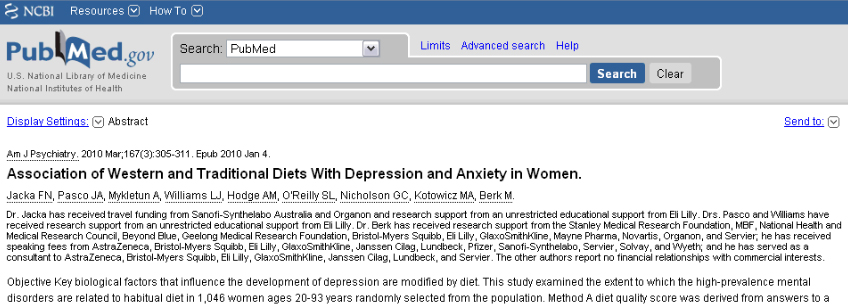PubMed urged to include funding info, conflicts of interest with study abstracts

The experts, along with six organizations, today urged the National Institutes of Health and its National Library of Medicine to require journals included in PubMed to list researchers’ funding sources and potential conflicts of interests in abstracts to make the search results on the popular site even more useful.
Numerous studies have documented that industry-funded research is often associated with results favorable to the funders’ interests, the scientists wrote to NIH director Francis S. Collins and NLM acting director Betsy L. Humphreys. PubMed, which is searched hundreds of millions of times a year, according to the letter, should advise users about the entity or entities that funded the studies that appear in search results. A disclosure might indicate the authors reported no competing interests, or read something like this: “This study was funded by Pfizer Corp. John Smith reported receiving consulting fees from Pfizer Corp. and Dow Chemical Co. Joan Jones reported receiving research support from Procter & Gamble and speaking honoraria from 7 food and drug companies.”

More and more medical and scientific journals routinely provide information about funding and competing interests, making it feasible for PubMed to display it, according to the letter. While some PubMed users have access to the full text of journal articles, those without a subscription to the myriad of journals have to rely on PubMed abstracts. The federal government spends $300 million a year to maintain PubMed.
The letter to Collins and Humphreys included Nicholas A. Ashford of the Massachusetts Institute of Technology, Lisa Bero of the University of Sydney, Stanton A. Glantz of the University of California San Francisco, and Center for Science in the Public Interest president Michael F. Jacobson, who organized the letter, as signatories. The Environmental Working Group, Humane Society of the United States, Natural Resources Defense Council, Union of Concerned Scientists, and World Public Health Nutrition Association also cosigned the letter.
The letter cites research published in Cochrane Collaboration, PLoS Medicine, and elsewhere that found that outcomes of studies on drugs, medical devices, and nutrition were often favorable to funders’ interests.
One signatory, nutrition scientist Marion Nestle of New York University, has for the past year tracked industry-funded studies on her blog, FoodPolitics.com. By her count, of 168 funded studies brought to her attention, 156 have reported results favorable to the sponsors’ interests, and just 12 have reported results unfavorable to the sponsor.
“That’s more than enough to make this point,” Nestle wrote. “It’s a lot easier to find industry-funded studies with results favorable to the sponsor’s interest than against it.”
“PubMed is an incredibly valuable resource for scientists, physicians, librarians, journalists, and the general public,” Jacobson said. “Adding information about researchers’ funding would be enormously helpful to its users around the world, especially journalists, who should be disclosing studies’ funding sources more consistently.”
Separately, Senators Richard Blumenthal (D-CT), Richard Durbin (D-IL), Ed Markey (D-MA), Brian Schatz (D-HI), and Elizabeth Warren (D-MA) are also writing NIH and NLM in support of including disclosures of competing interests in PubMed searches.
To show that adding financial information to PubMed abstracts would be feasible, CSPI showed one abstract with exactly that information that the NLM apparently posted by mistake. CSPI says the National Library of Medicine should also add competing-interest disclosures to Toxline, a more specialized bibliographic database of studies on drugs and other chemicals, as well as other databases that NLM sponsors.

